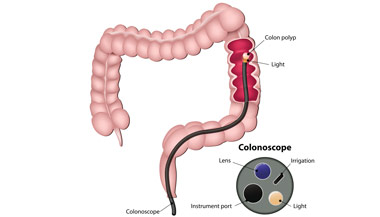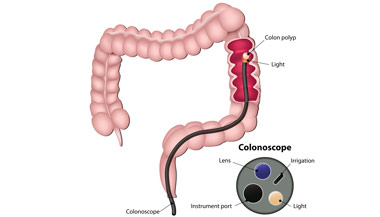Familial Adenomatous Polyposis Treatment
Treatment of familial adenomatous polyposis (FAP) and other colorectal conditions will usually involve a form of colorectal surgery.
Familial Adenomatous Polyposis Treatment: Surgery
If you have polyps, then the best course of action is colorectal surgery. Completely removing the cancer will alleviate your symptoms and offer you the best chance of a cure. Removing the colon is the only way to prevent colorectal cancer from developing.
You may have preoperative evaluations to rule out metastatic disease (cancer that has spread to other organs). Surgery also allows your doctor to stage the cancer, which is determining how severe it is.
Total Proctocolectomy with Brooke Ileostomy
During this procedure, your entire colon and rectum are removed. Your doctor will perform an ileostomy, which brings your small intestine out through the abdominal wall. Waste collects in an ileostomy bag. This procedure is generally performed when:
- Invasive cancer is found in the rectum
- The anal sphincter is not functioning normally
- The sphincter muscle is weak
An ileostomy can be temporary or permanent.
Colectomy with Ileorectostomy
In this procedure, the colon is removed but all or most of the rectum is preserved. Then the small intestine is attached to the upper portion of the rectum. This is a less complicated operation than a total proctocolectomy and preserves bowel function. The main concern is that by not removing the rectum, there is potential for polyps and cancer to develop.
Restorative Proctocolectomy
During this procedure, the entire colon and most of or the entire rectum is removed. The end of the small intestine (ileum) is attached to the rectum with the creation of an ileal pouch. The advantage of this procedure is that you may maintain bowel continence while removing all of the at-risk large intestinal lining. The ileal pouch provides a place for rectal storage. Typically, the operation is performed in two stages:
- A temporary ileostomy is created.
- After a period of time, your doctor removes the ileostomy to direct the intestinal waste to the ileoanal pouch
Follow-up Care After Colorectal Surgery
After your surgery, you will need:
- A complete physical exam every year
- Upper endoscopy every one to four years
- Flexible sigmoidoscopy every year
Dietary Considerations After Colorectal Surgery
If you had a total colectomy with ileostomy, you should chew foods well and eat slowly. You should drink six to eight glasses of liquids every day.
For the first six weeks after your surgery, you will need to follow a strict diet to avoid anal irritation and ensure you are having frequent bowel movements. After six weeks, you may slowly begin to expand your diet and experiment with foods, one at a time.
Your medical team will give you more detailed information about the new diet you should follow.
Lifestyle After Colorectal Surgery
Many patients worry about their sexual function after bowel surgery. Sexual function is not impaired after bowel surgery or ileostomy. However, it is important that you and your partner understand the surgery and feel comfortable with it.
A woman may be able to have a successful pregnancy following this surgery. If you plan to become pregnant you should consult your physician.






